|
|
|
Sort Order |
|
|
|
Items / Page
|
|
|
|
|
|
|
| Srl | Item |
| 1 |
ID:
079893
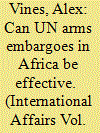

|
|
|
|
|
| Publication |
2007.
|
| Summary/Abstract |
Calls in 2007 for new UN sanctions on Iran and Burma reflect a current swing back in favour of using sanctions as a way of putting pressure on a regime without resorting to direct military engagement. This article assesses the effectiveness of UN sanctions in Africa and in particular of the most commonly imposed form of sanctions-the arms embargo. The article argues for an analysis of what sanctions achieve and suggests that for the most part UN embargoes have not stopped weapons reaching Africa not only because of the lack of capacity to implement them in some states, but also because of the lack of political will in others. In some post-conflict situations such as Liberia, UN sanctions have been adapted to support economic reconstruction and security sector reform effectively. However, in the future there is likely to be a decrease in the use of UN sanctions in Africa but an increase in their use by the Africa Union and some of Africa's Regional Economic Communities
|
|
|
|
|
|
|
|
|
|
|
|
|
|
|
|
| 2 |
ID:
079895


|
|
|
|
|
| Publication |
2007.
|
| Summary/Abstract |
Once it was an environmental issue, then an energy problem, now climate change is being recast as a security threat. So far, the debate has focused on creating a security 'hook', illustrated by anecdote, to invest climate negotiations with a greater sense of urgency. Political momentum behind the idea of climate change as a security threat has progressed quickly, even reaching the United Nations Security Council. This article reviews the linkages between climate change and security in Africa and analyses the role of climate change adaptation policies in future conflict prevention. Africa, with its history of ethnic, resource and interstate conflict, is seen by many as particularly vulnerable to this new type of security threat, despite being the continent least responsible for global greenhouse gas emissions. Projected climatic changes for Africa suggest a future of increasingly scarce water, collapsing agricultural yields, encroaching desert and damaged coastal infrastructure. Such impacts, should they occur, would undermine the 'carrying capacity' of large parts of Africa, causing destabilizing population movements and raising tensions over dwindling strategic resources. In such cases, climate change could be a factor that tips fragile states into socio-economic and political collapse.
Climate change is only one of many security, environmental and developmental challenges facing Africa. Its impacts will be magnified or moderated by underlying conditions of governance, poverty and resource management, as well as the nature of climate change impacts at local and regional levels. Adaptation policies and programmes, if implemented quickly and at multiple scales, could help avert climate change and other environmental stresses becoming triggers for conflict. But, adaptation must take into account existing social, political and economic tensions and avoid exacerbating them
|
|
|
|
|
|
|
|
|
|
|
|
|
|
|
|
| 3 |
ID:
079882
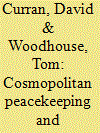

|
|
|
|
|
| Publication |
2007.
|
| Summary/Abstract |
The article is organized into two main parts. First, it presents the termination of the conflict in Sierra Leone as a case-study to examine the degree to which cosmopolitan values connecting peacekeeping and peacebuilding are (or are not) evident. The case-study looks at the United Nations Mission in Sierra Leone (UNAMSIL) as a model of successful peacekeeping in the sense that everyday security was provided for the people of Sierra Leone through the deployment of a robust peacekeeping mission. This assessment needs to be qualified in relation to serious deficits still to be addressed in post-conflict peacebuilding, yet the success of this mission does provide encouragement for those who see the construction of a cosmopolitan security architecture for Africa as both desirable and achievable. Second, it explores the degree to which an appropriate model of cosmopolitan peacekeeping might emerge at regional and continental levels in Africa through the development of the African Standby Force (ASF). What the case-study presented here and the survey of the African Union (AU)/ASF in the second part of the article have in common is that taken together, they provide some evidence to suggest that, however fragile, the AU is beginning to define an agenda that represents a continent wide and, in that sense at least, a cosmopolitan response to African security issues
|
|
|
|
|
|
|
|
|
|
|
|
|
|
|
|
| 4 |
ID:
079881
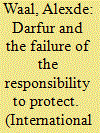

|
|
|
|
|
| Publication |
2007.
|
| Summary/Abstract |
When official representatives of more than 170 countries adopted the principle of the 'responsibility to protect' (R2P) at the September 2005 World Summit, Darfur was quickly identified as the test case for this new doctrine. The general verdict is that the international community has failed the test due to lack of political will. This article argues that the failure is real but that it is more fundamentally located within the doctrine of R2P itself. Fulfilling the aspiration of R2P demands an international protection capability that does not exist now and cannot be realistically expected. The critical weakness in R2P is that the 'responsibility to react' has been framed as coercive protection, which attempts to be a middle way between classic peacekeeping and outright military intervention that can be undertaken without the consent of the host government. Thus far, theoretical and practical attempts to create this intermediate space for coercive protection have failed to resolve basic strategic and operational issues. In addition, the very act of raising the prospect of external military intervention for human protection purposes changes and distorts the political process and can in fact make a resolution more difficult. Following an introductory section that provides background to the war in Darfur and international engagement, this article examines the debates over the R2P that swirled around the Darfur crisis and operational concepts developed for the African Union Mission in Sudan (AMIS) and its hybrid successor, the UN-African Union Mission in Darfur (UNAMID), especially during the Abuja peace negotiations. Three operational concepts are examined: ceasefire, disarmament and civilian protection. Unfortunately, the international policy priority o bringing UN troops to Darfur had an adverse impact on the Darfur peace talks without grappling with the central question of what international forces would do to resolve the crisis. Advocacy for the R2P set an unrealistic ideal which became the enemy of achievable goals
|
|
|
|
|
|
|
|
|
|
|
|
|
|
|
|
| 5 |
ID:
079896
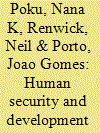

|
|
|
|
|
| Publication |
2007.
|
| Summary/Abstract |
There has been a recent rise in optimism about Africa's prospects: increased economic growth; renewed regional and national political commitments to good governance; and fewer conflicts. Yet, given current trends and with less than eight years until 2015, Africa is likely to fail to meet every single one of the Millennium Development Goals (MDGs). Home to almost one-third of the world's poor, Africa's challenges remain as daunting as ever. Despite highly publicized increased growth in some economies, the combined economies of Africa have, on average, actually shrunk and are far from meeting the required 7 per cent growth needed to tackle extreme poverty. A similar picture emerges from the analysis of Africa's performance on the other MDGs. In a world where security and development are inextricably connected in complex and multifaceted ways, Africans are, as a result, among the most insecure. By reviewing a select number of political, security and socio-economic indicators for the continent, this analysis evaluates the reasons underlying Africa's continuing predicament. It identifies four critical issues: ensuring peace and security; fostering good governance; fighting HIV/ AIDS; and managing the debt crisis.
In assessing these developmental security challenges, the article recalls that the MDGs are more than time bound, quantified targets for poverty alleviation-they also represent a commitment by all members of the international community, underwritten by principles of co-responsibility and partnership, to an enlarged notion of development based on the recognition that human development is key to sustaining social and economic progress. In recent years, and often following failures, especially in Africa, to protect civilian populations from the violence and predation of civil wars, a series of high-level commissions and expert groups have conducted strategic reviews of the UN system and its function in global politics. The debate has also developed at the theoretical level involving both a recon-ceptualization of security, from state centred norms to what is referred to as the globalization of security around the human security norm. There has also been a reconceptualization of peacekeeping, where the peacekeeping force has enough robustness to use force not only to protect populations under the emergent responsibility to protect norm, but also enough conflict resolution capacity to facilitate operations across the conflict-development-peacebuilding continuum. This article opens up a discussion of how these ideas might be relevant to security regime building and conflict resolution in African contexts, and suggests how initiatives in Africa might begin to make a contribution to the theory and practice of cosmopolitan peacekeeping
|
|
|
|
|
|
|
|
|
|
|
|
|
|
|
|
| 6 |
ID:
079894


|
|
|
|
|
| Publication |
2007.
|
| Summary/Abstract |
Popular perceptions of corruption, poverty and the 'resource curse' in the oil-rich Gulf of Guinea can be caricatured as belonging to (or falling between) two possible positions. First, the fault lies with oil companies, exploiting, bribing and otherwise abusing innocent Africans. Second, the blame lies with corrupt African rulers, stealing the oil money. There is truth in each position, but this is now a stale, unhelpful debate, obscuring other aspects of the problem. Several themes merit more attention. First, taxation in resource-dependent states is different from what is found in other types of economy. Second, transparency and anti-corruption schemes like the Extractive Industries Transparency Initiative focus on revenue flows inside countries, ignoring crucially important transnational flows. Third, natural resources provoke competition and factional politics, fragmenting the public interest. These three lead to a fourth way of conceptualizing the issue-as a systemic one, which is not ultimately the result of bad behaviour (or even of 'culture'). We should move away from focusing too much on actors and behaviour and instead focus on systems and processes, a shift that will result in different (or additional) policy prescriptions, new (or expanded) branches of economics and political science. This article does not depend on statistical analysis but instead takes a bottom-up view, based on nearly 15 years' research into oil and politics in sub-Saharan Africa, including interviews with numerous key players, to explore the dynamics of the resource curse
|
|
|
|
|
|
|
|
|
|
|
|
|
|
|
|
| 7 |
ID:
079897
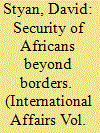

|
|
|
|
|
| Publication |
2007.
|
| Summary/Abstract |
This article provides an overview of selected aspects of how the economic security of growing numbers of Africans is linked to international migration. It first examines the emergence since 2005 of a new international policy discourse emphasizing the positive economic benefits of migration through remittance flows, the transfer of ideas and inward investment by migrants. The article outlines European policy responses to the recent upsurge in illegal Africa migration across the Mediterranean and examines the reaction of African governments and the Africa Union to increased migration and the enhanced dependence of African economies on remittance flows. The final section highlights the way in which the accelerated settlement of Africans in the UK prefigures longer term changes in the UK's relationship with Africa
|
|
|
|
|
|
|
|
|
|
|
|
|
|
|
|
| 8 |
ID:
079880


|
|
|
|
|
| Publication |
2007.
|
| Summary/Abstract |
This article attempts to clarify some of the central questions and distinctions that provide the necessary backdrop for thinking in a sophisticated way about security in Africa. Drawing on the developing Critical Security Studies literature it suggests that an understanding of security based on people, justice and change offers the surest route to a stable future. It then sketches preliminary answers to some fundamental questions, namely: whose security should be prioritized? How have security dynamics in Africa been influenced by the wider processes driving world politics? What clusters of threats are the most salient? Where do such threats have the most pernicious effects? Which actors are best placed to alleviate those threats? And what sort of institutions should be built to assist in that process? The role of outsiders concerned with promoting security on the continent should be to try to ensure that as many Africans as possible are able to voice their opinions on these crucial issues.
|
|
|
|
|
|
|
|
|
|
|
|
|
|
|
|
| 9 |
ID:
079891
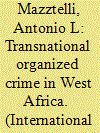

|
|
|
|
|
| Publication |
2007.
|
| Summary/Abstract |
Despite its vast natural and human resources and the undisputed progress made in the last decade towards the establishment of democratic culture and governing systems, West African countries continue to occupy the bottom ranks of the UN Human Development Index. Similarly, many of them score poorly in World Bank and Transparency International indexes that measure good governance. The international mass media have recently highlighted the role played by the West African region in the transatlantic cocaine trade, as well as in the flow of illegal migrants to Europe. Drugs and migrants are, however, just two of the numerous illicit activities that feed the growth of local and transnational criminal organizations, and the establishing of a culture of quick and easy money that is progressively eroding the foundations of any sustainable and well balanced socio-economic development. The pervasive power of the corruption of criminal organizations, coupled with a general crisis by state actors in the administration of justice and enforcement of the rule of law, contribute towards the progressive diminishing of the credibility of the state as the institution entrusted with the prerogatives of guaranteeing security (of people and investments) and dispensing justice. In this context, the case of Guinea Bissau is probably the clearest example of what West African states may face in the near future if the issues of justice and security are not properly and promptly addressed. If primary responsibilities lie with West African governments and institutions, the international community as a whole should also review its approach to development policies by not only mainstreaming the issues of security and justice in their bilateral and multilateral agendas, but also by making it an essential cornerstone of policies and programmes aimed at supporting good governance and the establishment of states ruled by the law.
|
|
|
|
|
|
|
|
|
|
|
|
|
|
|
|
| 10 |
ID:
079892


|
|
|
|
|
| Publication |
2007.
|
| Summary/Abstract |
This article demonstrates how concepts and notions such as 'warlordism' and 'terrorism', supposedly framed to enable an understanding of complex crises, can have exactly the opposite effect. It exposes their conceptual ambiguity, a factor contributing to their success, and comments on their practical application in the Somali context. The article seeks to analyse how these two 'categories' have contributed to building a specific 'regime of truth'-vocabulary, assumptions of meaning, labels and narratives that function to select and interpret events, emphasizing some and disregarding many others. The article presents the argument that the recurrent mobilization of these particular expressions has resulted not in deepening analysis, but rather in sifting information and providing moral condemnation and political prescription that are highly debatable
|
|
|
|
|
|
|
|
|
|
|
|
|
|
|
|
|
|
|
|
|